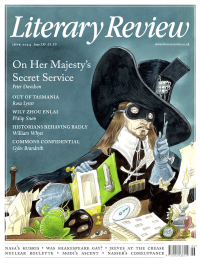Miles Pattenden
Soldiers, Pilgrims & Brigands
The Roads to Rome: A History
By Catherine Fletcher
The Bodley Head 400pp £25
Mobility can feel like a modern marvel. We missed it during the pandemic. Now it’s back. Received opinion laments its effects: it exhausts our bodies and the planet. Being mobile still seems so cutting edge, though. Who in past ages could travel so far or so fast? Which generation of yore could see the world as we do? How many of the ancients truly understood the journey’s centrality to human experience? The past is less a foreign country than a road less travelled in such a line of thought.
Catherine Fletcher’s new book is part of a growing body of historical writing which calls out this way of thinking as mere delusion. Modernity, with its checks and controls, and the capacity of states to quarantine whole populations, is history’s exception. In the past, people were in constant motion, so we should all pay more attention to the effects this had – on literature, culture, economies, societies and landscapes. Historians need to enquire further into the means by which people were mobilised, which brings us to the Romans and their roads. Roman roads run everywhere, and Fletcher has been on most of them: up the Via Aurelia, down the Via Casilina, across the Via Augusta and the Via Egnatia – how many miles again? It has been her labour of love to crisscross an entire continent.
Fletcher’s book is an exemplar of history as travelogue. It presents a familiar panorama – of Europe since antiquity – but from an unfamiliar, even original perspective. Chapters address the rise and fall of the Roman Empire, Byzantium, popes, the Renaissance, the grand tour, Napoleon, Garibaldi, Mussolini and so

Sign Up to our newsletter
Receive free articles, highlights from the archive, news, details of prizes, and much more.@Lit_Review
Follow Literary Review on Twitter
Twitter Feed
It wasn’t until 1825 that Pepys’s diary became available for the first time. How it was eventually decrypted and published is a story of subterfuge and duplicity.
Kate Loveman tells the tale.
Kate Loveman - Publishing Pepys
Kate Loveman: Publishing Pepys
literaryreview.co.uk
Arthur Christopher Benson was a pillar of the Edwardian establishment. He was supremely well connected. As his newly published diaries reveal, he was also riotously indiscreet.
Piers Brendon compares Benson’s journals to others from the 20th century.
Piers Brendon - Land of Dopes & Tories
Piers Brendon: Land of Dopes & Tories - The Benson Diaries: Selections from the Diary of Arthur Christopher Benson by Eamon Duffy & Ronald Hyam (edd)
literaryreview.co.uk
Of the siblings Gwen and Augustus John, it is Augustus who has commanded most attention from collectors and connoisseurs.
Was he really the finer artist, asks Tanya Harrod, or is it time Gwen emerged from her brother’s shadow?
Tanya Harrod - Cut from the Same Canvas
Tanya Harrod: Cut from the Same Canvas - Artists, Siblings, Visionaries: The Lives and Loves of Gwen and Augustus John by Judith Mackrell
literaryreview.co.uk